The Top 20 Satirical Candidates Of All Time
#13. Ficus for Congress
 In April 2000 filmmaker Michael Moore sent out a warning to incumbent congressmen that they would no longer be able to expect to run uncontested for re-election. He called upon Americans to vote instead for a potted plant. Specifically, a Ficus ("a genus of tropical shrub or tree with glossy, leathery leaves, often found indoors as an ornamental").
In April 2000 filmmaker Michael Moore sent out a warning to incumbent congressmen that they would no longer be able to expect to run uncontested for re-election. He called upon Americans to vote instead for a potted plant. Specifically, a Ficus ("a genus of tropical shrub or tree with glossy, leathery leaves, often found indoors as an ornamental").Moore pointed out the advantages of a Ficus. All it needs is air, sunlight, water, and a little fertilizer (which the Ficus "should find plenty of in Washington").
In addition, "I've seen a lot of politicians lie, cheat, steal, and use improper syntax. I have never met one who can perform photosynthesis."
Links: Common Dreams
#12. Gracie Allen
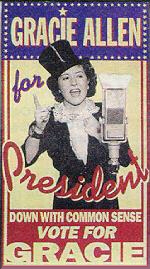 Comedian Gracie Allen, of the Burns and Allen comedy team, announced on radio in 1940 that she was running for President. Other comedians had run for President before, but her candidacy proved to be a far more elaborate affair that included a 34-city campaign tour.
Comedian Gracie Allen, of the Burns and Allen comedy team, announced on radio in 1940 that she was running for President. Other comedians had run for President before, but her candidacy proved to be a far more elaborate affair that included a 34-city campaign tour.She ran as the candidate of the Surprise Party. Her mascot was a kangaroo, and her slogan was "It's in the bag." She had a campaign song, "Vote for Gracie," that included the line, "If the country's going Gracie, so can you." She invented the concept of sew-on campaign buttons, to discourage her supporters from changing their minds. But one thing she refused to do while campaigning was kiss male babies "until they're over 21."
Her platform was "redwood trimmed with 'nutty' pine." She proposed making Congress work on a commission: "Whenever the country prospered, Congress would get 10 percent of the additional take." She supported good foreign relations, "so long as they bring their own bedding and don't stay too long." She also believed that Civil Service should be extended to all branches of government, because "a little politeness goes a long way." As for her gender, she noted: "If a woman isn't qualified to be president, why is it you never see anything but pants on scarecrows?"
The high point of her campaign came when the citizens of Monominee, Michigan elected her mayor of their town. However, she was later disqualified due to the fact that she was a non-resident. "A person can't live everywhere," she noted.
After the campaign was over, she wrote the book "How to Become President" (with the help of ghostwriters). It offered advice to future candidates. For instance, "You should come from a good family, because while breeding isn't everything, it is said to be lots of fun."
Links: Gracie Allen's 1940 Presidential Campaign
#11. Pogo for President
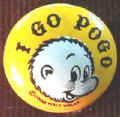 Walt Kelly started publishing the Pogo comic strip in 1949, detailing the life of a possum who was a resident of the Okefenokee Swamp. In 1952, during the "I Like Ike" campaign, Kelly announced that Pogo was running for President.
Walt Kelly started publishing the Pogo comic strip in 1949, detailing the life of a possum who was a resident of the Okefenokee Swamp. In 1952, during the "I Like Ike" campaign, Kelly announced that Pogo was running for President. Pogo was a reluctant candidate. "I'm not a president," he said, "I'm just a possum who likes to fish." His platform was also very simple. He stated a preference for "a regular old-fashioned flat-bottomed type platform for use at land or sea." Nevertheless, his candidacy turned out to be wildly popular.
Millions of "I Go Pogo" campaign buttons were sold. NBC promised complete coverage of the Pogo Party bid. Kelly noted, "We hope to lull the regular parties into a false sense of security by our reported attempts to clarify the issues. Once they have laughed us off, then we will strike."
The most memorable moment of the campaign came when 1600 students gathered at Harvard Square for a Pogo for President rally. The meeting grew so out of control that it escalated into a riot, and 28 Harvard students were arrested. Near-riots happened at other campuses. For instance, at Williams College students marched around town for an hour, halting traffic, chanting "We Go Pogo."
On election day, Pogo reportedly received more votes than either the Nudist or Vegetarian Parties.
Pogo's reluctant campaign continued in following years, though it never again attracted the same amount of publicity.
Links: I Go Pogo
#18. The Milton Mule
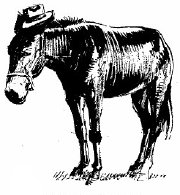 On September 13, 1938 Boston Curtis won the post of Republican precinct committeeman in Milton, Washington. Fifty-one votes were cast for him. Those who voted for him were later surprised to discover he was a long-eared docile brown mule.
On September 13, 1938 Boston Curtis won the post of Republican precinct committeeman in Milton, Washington. Fifty-one votes were cast for him. Those who voted for him were later surprised to discover he was a long-eared docile brown mule.Boston Curtis’s election victory was engineered by Milton’s Democratic mayor, Kenneth Simmons. Simmons had taken the mule down to the courthouse and placed its hoofprint on all the documents necessary to register it to run. The hoofprint appeared on the records as a smeared mark. Simmons also signed his own name to the documents as a witness.
Simmons came up with the name “Boston Curtis” by combining the mule’s name of “Boston” with the name of its owner, Mrs. Charles Curtis.
Simmons gave two reasons for the stunt. First, he wanted to embarrass the Republican party. (The joke was that the Republicans had voted in a cousin of the Democratic party’s donkey symbol.) He also wanted to demonstrate the inefficiency of the primary system by proving that voters often “know not whom they support.”
Links: Hoaxipedia
#16. Will Rogers
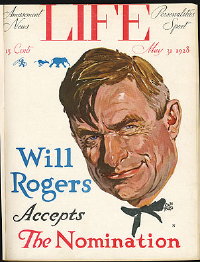 In 1928 Robert Sherwood, editor of the humor magazine Life, suggested to comedian Will Rogers that he run for President. Rogers said that "the offer to run struck him like a bolt out of the blue, leaving him dazed." But he realized that "being dazed, he would make a splendid candidate."
In 1928 Robert Sherwood, editor of the humor magazine Life, suggested to comedian Will Rogers that he run for President. Rogers said that "the offer to run struck him like a bolt out of the blue, leaving him dazed." But he realized that "being dazed, he would make a splendid candidate."Rogers named himself the candidate of the Anti-Bunk Party, and began writing a series of articles for Life promoting his candidacy.
He made a number of campaign promises. For instance, "Whatever the other fellow don't do, we will." And, "There'll be more wine for the rich, beer for the poor and moonshine liquor for the prohibitionist." He also promised that, if elected, he would resign, and that he would make no campaign promises.
Rogers suggested that, "Our support will have to come from those who want nothing and have the assurance of getting it." But he received many high-profile endorsements, including from Amelia Earhart, Babe Ruth, and Henry Ford.
He reportedly gained a substantial write-in vote and claimed to have won the District of Columbia. His campaign articles were collected together in He Chews to Run, published in 1928.
Links: WillRogers.com
#19. Joan JettBlakk
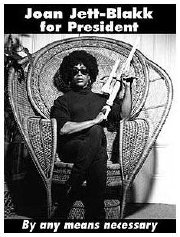 In 1992 the drag queen Joan JettBlakk (alter ego of Terence Smith) announced she was throwing her wig into the ring and running a "camp-pain" to become President of the United States as the candidate for the Queer Nation Party. Her slogan was "Lick Bush in '92." She had previously run unsuccessfully for Mayor of Chicago.
In 1992 the drag queen Joan JettBlakk (alter ego of Terence Smith) announced she was throwing her wig into the ring and running a "camp-pain" to become President of the United States as the candidate for the Queer Nation Party. Her slogan was "Lick Bush in '92." She had previously run unsuccessfully for Mayor of Chicago.She wore hot-pink wigs and seven-inch high heels, which were also her official platform: "I walk on them every day. I'd like to see Bill (Clinton) wear these."
She didn't receive many votes, but she did walk in Chicago's St. Patrick's Day Parade and made it onto the floor of the Democratic National Convention.
Links: zeek.net
#17. Tiao the Chimp
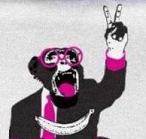 Tiao the Chimp was a resident of the Rio de Janeiro zoo when in 1988 he was put forward as a candidate in the mayoral election by the Brazilian Banana Party (a creation of the comedic group Casseta & Planeta). The slogan of his campaign was "Vote Monkey - Get Monkey."
Tiao the Chimp was a resident of the Rio de Janeiro zoo when in 1988 he was put forward as a candidate in the mayoral election by the Brazilian Banana Party (a creation of the comedic group Casseta & Planeta). The slogan of his campaign was "Vote Monkey - Get Monkey."Tiao was known for his bad temper. He often threw dirt and spit water at visitors. Nevertheless, his candidacy proved very popular. He recieved over 400,000 write-in votes in the election, which placed him third (out of 12 candidates).
When he died in 1996, the mayor of Rio de Janeiro ordered an eight-day mourning period in his honor.
#15. Yetta Bronstein
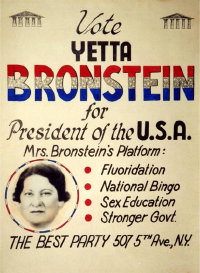 Yetta Bronstein, a 48-year-old Bronx housewife, ran for President in 1964 and 1968 as the candidate for the Best Party. Her slogans were "Vote for Yetta and watch things get better" and "Put a mother in the White House."
Yetta Bronstein, a 48-year-old Bronx housewife, ran for President in 1964 and 1968 as the candidate for the Best Party. Her slogans were "Vote for Yetta and watch things get better" and "Put a mother in the White House."Her proposals included national bingo, self-fluoridation, placing a suggestion box on the White House fence, and printing a nude picture of Jane Fonda on postage stamps "to ease the post office deficit and also give a little pleasure for six cents to those who can't afford Playboy magazine."
She promised she would staff her cabinet with "people who have failed in life and learned to live with it."
"Why should you vote for me?" her campaign literature asked. "Think of all the things your mother did for you -- the feeding, changing, washing, ironing, lying for you, crying for you. Now you can pay her back by putting me in office. I will represent all your mothers and act in their behalf for you."
Yetta never made a campaign appearance, conducting the campaign entirely by mail and phone. Nevertheless, the Bronstein for President campaign was widely covered by the media.
The reason for Yetta's lack of personal appearances was that she didn't exist. She was the fictional creation of hoaxer Alan Abel. His wife Jeanne pretended to be Yetta on the phone. Abel used a picture of his own mother as a front for the hoax.
Links: AlanAbel.com
#20. Superbarrio
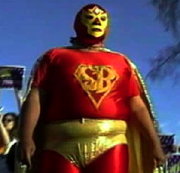 Superbarrio Gomez, a real-life overweight Mexican superhero who wears a wrestling mask, red tights, and golden cape, ran for President of North America in 1996. He held campaign rallies on both sides of the U.S./Mexico border. His supporters would chant "Go, go, Gomez" while waving banners reading "Superbarrio for President."
Superbarrio Gomez, a real-life overweight Mexican superhero who wears a wrestling mask, red tights, and golden cape, ran for President of North America in 1996. He held campaign rallies on both sides of the U.S./Mexico border. His supporters would chant "Go, go, Gomez" while waving banners reading "Superbarrio for President."Superbarrio proposed eliminating U.S. border patrols, dissolving the U.S. Drug Enforcement Administration, and allowing free migration throughout North America.
He claimed to be endorsed by Superman, Spider Man, Batman and the Power Rangers.
Links: listserv
#14. Sister Boom Boom
In 1982 Sister Boom-Boom ran for a seat on the eleven-member San Francisco Board of Supervisors. She was a member of the Sisters of Perpetual Indulgence, an order of gay male nuns dedicated to "the promulgation of universal joy and the expiation of stigmatic guilt." She listed her party affiliation as "Nun of the Above."Dressed in mesh stockings, spike heels and a nun's habit cut to miniskirt length, she was the alter ego of Jack Fertig, a San Francisco transvestite.
Although she didn't win, she did receive 23,124 votes, and later ran in the mayoral election (but again, didn't win).
Her success was widely credited with prompting Mayor Dianne Feinstein to sign into law a measure requiring all people running for office to do so using their legal name. It came to be known as the "Sister Boom Boom Law."
Links: Sistory, StarJack.com
All text Copyright © 2014 by Alex Boese, except where otherwise indicated. All rights reserved.
